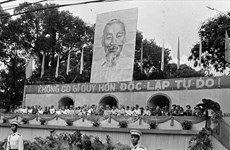Philippines highlights ASEAN’s centrality
Philippine Ambassador to Vietnam Meynardo Los Banos Montealegre has highlighted Philippines' priorities, post-pandemic economic and tourism recovery in the region as well as challenges that ASEAN is facing in an interview granted to the Vietnam News Agency on the occasion of the 40th and 41st ASEAN Summits and related summits taking place in Cambodia from November 10-13.
 Philippine Ambassador to Vietnam Meynardo Los Banos Montealegre (Photo: Philippine Embassy in Vietnam)
Philippine Ambassador to Vietnam Meynardo Los Banos Montealegre (Photo: Philippine Embassy in Vietnam) Reporter: Philippine President Ferdinand R. Marcos, Jr. will attend the 40th and 41st ASEAN Summits for the first time as the country’s 17th chief executive. What are his priorities at the Summits?
Ambassador: The President Ferdinand R. Marcos, Jr. will discuss with the other ASEAN leaders the need for further cooperation on maritime security, climate change, food security, health cooperation and economic recovery.
ASEAN has always been the cornerstone of the Philippines’ foreign policy and through these Summits, President Marcos will convey the Philippines’ continuing support for ASEAN centrality, extend his deep regard to Cambodia as the current ASEAN Chair, and ensure full support to Indonesia’s upcoming chairmanship of the ASEAN.
The President also intends to address regional issues such as the pandemic, the situation in Myanmar, developments in the South China Sea (called the East Sea by Vietnam), and the ongoing conflict between Russia and Ukraine, among others. As the head of state, the President will seek cooperation with his counterparts on key important matters or priorities under his administration such as food security, trade cooperation and climate change. The President has also emphasised that through the Summits, he aims to forge new partnerships and strengthen existing ones by promoting the Philippines not only as an investment and tourism center but as a reliable partner for our ASEAN neighbors and beyond.
Reporter: What do you think about regional economic and tourism recovery in the post-COVID-19 period and what should ASEAN do to promote ASEAN centrality in regional connectivity?
Ambassador: Economic activity and tourism across the region have nearly returned to normal. There is actually a huge demand for goods and services, and many people in ASEAN are eager to travel. The demand is, however, dampened by high inflation rate, shortage on important inputs due to supply chain disruptions, and severe energy supply shortage.
Demand for travel within the region has regained momentum even if there are fewer Chinese tourists compared to previous years. But as I have mentioned, the high fuel cost and the lack of competent manpower in the hotel and service industry and airline industry are also pushing the cost upwards to the detriment of the travelers and the tourism industry.
Given that these are transboundary concerns, I think these issues must be discussed collectively by ASEAN in the Summits. It is imperative for the region to maintain connectivity and ensure reliability of supply lines since other countries in the Western hemisphere and in Europe grapple with their own domestic and regional issues. As the world prepares for an impending global recession, ASEAN must remain steadfast in its economic and political commitments. It must remain as a reliable contributor to global economic stability and political peace.
Reporter: Southeast Asian countries, particularly Vietnam and the Philippines, are facing enormous challenges due to climate change. In your opinion, what should ASEAN do to deal with the issue?
Ambassador: The region is developing rapidly along with Vietnam and the Philippines. Living standards are also changing rapidly and the demand for sources of energy emitting greenhouse gases within the region is also increasing. Nonetheless, since many ASEAN countries – Vietnam and the Philippines, in particular – have the biggest stake in ensuring resolution to climate change, ASEAN must remain committed to implement policies that promote the development of renewable energy resources, green economy and implement circular economy principles.
Reporter: How do you think about Vietnam’s engagement in and contribution to building an equal, strong and inclusive ASEAN community for harmony, peace and prosperity in the region?
Ambassador: Vietnam has been very actively involved in the ASEAN region and I am impressed with the progress of Vietnam’s political and economic maturity since it joined the ASEAN 27 years ago. It is a reliable contributor in the maintenance of peace and stability in the ASEAN region through its adherence to and promotion of international law and multilateralism, and for integrating with fellow ASEAN states and other Asia Pacific countries.
Vietnam has made a lot of contributions to ASEAN. On the national level, Vietnam has hosted several ASEAN meetings and summits and remains to host more ASEAN-related ministerial meetings. It has also successfully fulfilled of its role as ASEAN Chair in 2010 and in 2020 and as coordinator between ASEAN and key partner countries.
Domestically, I am also impressed with the vibrant and dedicated programmes and projects implemented by many Vietnamese provinces that encourage ASEAN cohesiveness and awareness among its people.
Reporter: Thank you very much!/.












